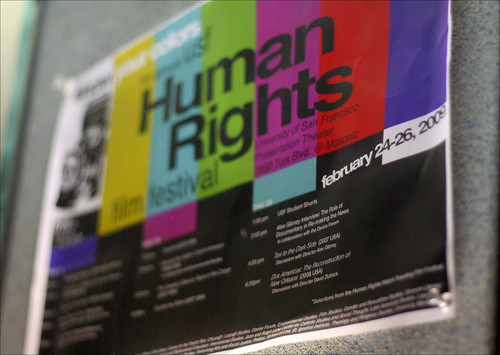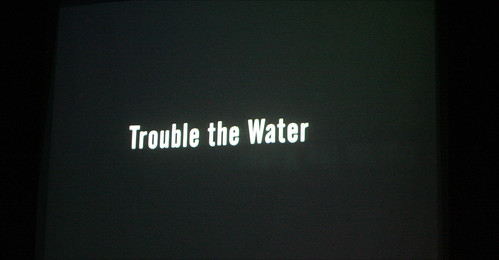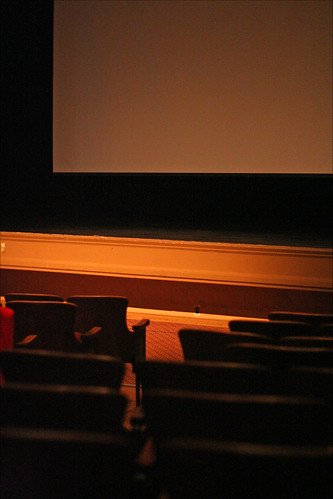
As a “documentary nerd”, I was extremely excited to watch the film Trouble the Water at USF's Human Rights Film 2008 film festival. Trouble the Water follows a lower class New Orleans couple, Kim and Scott, through their horrific experience of Hurricane Katrina. The filmmakers, Tia Lessin and Carl Deal, ingeniously incorporate Kim and Scott's own home footage of the hurricane, including scenes of being trapped in the attic of their house with five young children, watching the water rising. These scenes are easily the most compelling, scary, and heartbreaking of the entire film, especially when coupled with audio clips of 911 distress calls, such as this one:
911 operator: I'm sorry, but the police are not not sending any emergency units out until the weather gets better.
Caller: So I'm going to die?
-silence-
Caller: Hello?
911 operator: -pause- yeah?

It is impossible to fathom what it would be like to be one of the callers or the people who had to take them, but Trouble the Water does the best job possible. Kim and Scott are extremely likable and charismatic (Kim refers to Katrina as a “bad chick”) protagonists – both are self declared “thugs” who once used and sold drugs on the street, only to become undeniable heroes for the people in their neighborhood. The film takes us full circle, keeping up with Kim and Scott six months after the storm, and then another six months after that, when they had finally moved back to their old neighborhood. The audience laughed at Kim's banter throughout the ninety minutes, gasped at footage of dead animals, and shook their head in shame at the clips of President Bush'. Thousands of miles away in San Francisco, everyone watching was able to experience the Hurricane Katrina tragedy truly through the eyes of the victims.

To learn more about Trouble the Water, visit the film's website.
Your blog gave just enough detail to make me want to watch the film, without giving away too much. I enjoyed your use of the 911 distress calls within your blog, just as it pulled you into the film, it pulled me into your blog.
ReplyDeleteWhat a cool documentary...
ReplyDeleteI'm bummed I didn't get to see it. Hurricane Katrina was a tragic event. I couldn't imagine being there, just waiting around as the water rises.
You bring up an interesting point:
"It is impossible to fathom what it would be like to be one of the callers or the people who had to take them..."
Whenever I hear or talk about Katrina it is always about the victim. But what about the person answering the victim's calls. Till now I never really thought about how hard it must of been to recieve call after call from people who are in need of help, only to tell them that no help is coming. It is not that persons fault the police were not helping at the time, but they must have felt the burden.
Stereotypical victim or not, Katrina was a terrible event for all those involved. Your right! One can never grasp the full idea of Katrina until you've seen it through the victims eyes.
I really wanted to see this film and after reading your post I want to see it even more. Katrina was a huge disaster and I feel the only coverage it ever got was the news casts during the hurricane. I'm glad the film lets the audience see life post Katrina as well.
ReplyDeleteSome of the scenes you describe in your post sound chilling. You talked about the audience gasping and laughing at parts of the film but could you feel the tension in the room during the scenes filled with suspense? I have a feeling that would have added to the viewing experience.
Well written post. I think adding the transcript of the 911 call was a great idea. It helped define the tone of the film for me.
I really wish I had gone to see this. I have a couple questions for you, when did they make this seemingly miraculous transition from drug dealers to heroes? Had they reformed prior to Katrina? And if so how? Were they leading this rough and tumble life while simultaneously raising five young children?
ReplyDeleteThe reason I ask is because I'm always a little skeptical of documentaries. Especially those that attempt to make people heroes or glorify them. It'd be interesting to know when their drug dealing stopped. Perhaps it was years before Katrina when they had kids, perhaps they sold drugs until well into the first few years they had kids. Maybe they deserve to be called heroes, maybe not.
Ryan - I'm sure you could feel the suspense/tension in the air, but I didn't notice because I was glued to the screen during the riveting parts. If suddenly the power had gone off in the theater, I bet there would have been a collective outrage from the audience.
ReplyDeleteMelissa - the audience isn't given too much information on Kim and Scott and their past when the movie begins, we find out later the extent of their involvement in drugs and whatnot. From what I could tell, Katrina was the catalyst for their change for the better.
I wouldn't say they are exactly "glorified", but it is clear how selfless they were - none of the 5 kids in the attic were theirs (they didn't have any of their own), other neighbors in the attic commented on kim offering all of what little food and water she had saved, Scott uses a punching bag as a raft to move the kids out, etc.
A year after Katrina, Robert was working construction and Kim was active in protests and making music, and I think if they had slipped up and gone back to their old life, it would have been included. They were very open about their past, present, and future, and never come off as trying to be martyrs.
i'm with the rest of ya'll - this is a great post. really nice writing, Christina. i haven't seen the film but have wanted to see it for some time. now i want to see it even more.
ReplyDelete